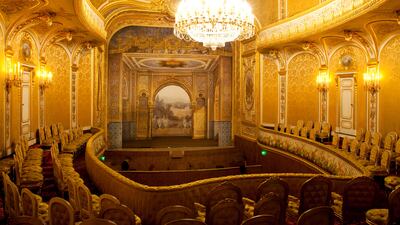I am aware that I run the risk of making myself deeply unpopular by saying this, but I will let you into a secret.
Although I am at work, I am not sat typing at my desk on the outer rim of The National's frantic newsroom, but on a damp but pleasantly sunny terrace overlooking the grounds of the Palace of Fontainebleau, about 75 kilometres as the crow flies to the south of Paris.
To my left is Europe's largest formal garden. Replete with white classical statues, immaculately-cut lawns, a central water feature and fountain and beds full of late summer flowers in pastel shades of pink, mauve, grey and purple that look just like a watercolourist's rheumy palette.
To my right is the modern town of Fontainebleau, a warren of streets overlooking the rambling, buff-coloured palace that are filled with bakeries and bistros, boutiques and florists and an exquisite, double-decker carousel that rotates like a giant musical box as it raises and lowers carefully colour co-ordinated stallions, seahorses and mares.
The reason for my visit? The latest phase of the restoration of the Sheikh Khalifa bin Zayed Al Nahyan Theatre, a rare gem of silk and candle-lit Second Empire design whose restoration has been made possible thanks to donations from Abu Dhabi.
Rather than feeling delightfully overwhelmed at the very Gallic charms of the situation however, I find myself reflecting on a regrettable and seemingly unavoidable episode that's made this foreign trip all too similar to the others I've made recently, whether to London or Tokyo, Milan or Paris.
"How can you live in such a place?" I am invariably asked, most often by highly-educated individuals who consider themselves not only knowledgeable in matters of the world but culturally sophisticated and politically liberal. "What does your wife say about having to cover up whenever she goes out and how does she cope without driving?"
Over the course of the last seven years I have heard these questions from fellow journalists, interpreters, tour leaders and academics, photographers, friends-of-friends, bankers and executives, proof – if any were needed – that there is no correlation between income and educational attainment and prejudice and
downright ignorance.
Even when I politely point out that the country I live in is defined by none of these characteristics, or that the UAE has female fighter soldiers, fighter pilots, politicians and diplomats or that 65 per cent of the university graduates in the UAE are women, my corrections are met with a look of disbelief and suspicion.
"Then what about all of those workers," a particularly aggrieved art critic once spat, simultaneously revealing their ignorance of geography and grammar, "who have died building all of those unnecessary World Cup football stadiums?"
Sadly, a survey was published this week that supports my personal experience with statistics that make for very unsurprising but far from cheerful reading.
Carried out by the pollsters YouGov and commissioned by the London-based newspaper, Arab News, and the Council for Arab-British Understanding, the survey of 1,200 British voters conducted in August set out to discover attitudes towards Arabs in the UK, 81 per cent of whom admitted to knowing little or nothing about the Arab world.
As well as revealing that most of the voters surveyed believe the number of Iraqi and Syrian refugees entering the UK has been too high, the survey also discovered the characteristics British people most associate with Arabs: gender segregation, wealth and Islam.
At the same time, only 15 per cent of those surveyed thought that the UK's foreign policy in the Arab world had helped human rights and security and even fewer, 13 per cent, believe that the UK's foreign policy has been a force for stability.
As a British citizen, I find this snapshot of fear and ignorance profoundly distressing, not least because my personal experience suggests that it extends far beyond my home to the rest of Europe, Asia and North America, a fear seemingly confirmed by the results of a similar poll that was conducted in May.
After surveying 2,057 US respondents, not only did this earlier YouGov poll find that 65 per cent of respondents admit to knowing little or nothing about the Arab world, but that more than one-fifth identified the fictional Sultanate of Agrabah as being part of the region and that 38 per cent would approve of a travel ban on its residents if the sultanate proved to be a menace.
The next time somebody asks me where I live, at least I now know what I will tell them. Agrabah, I will say, and then I'll sit back and wait to see if their ignorance is really as deep as it is shameless.
________________
Read more of Nick's columns:
A chance meeting with an old friend allows us to reflect on our lives
Foundations for the future are not always fruitful
Why I will always remember the Louvre Abu Dhabi I saw first
________________

